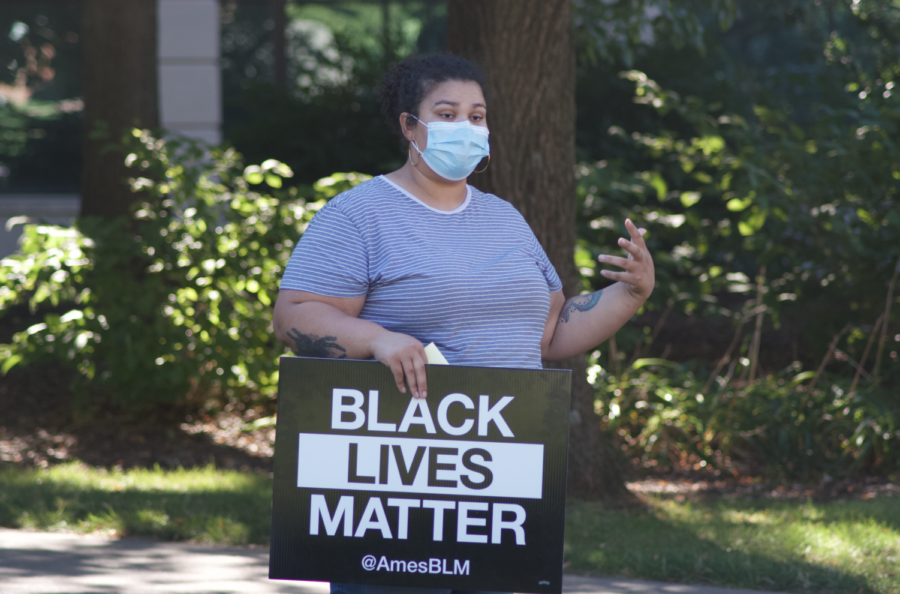Ames Black Lives Matter speaks on citizens’ rights when interacting with the police
August 17, 2020
When interacting with the police, leaders of the Ames Black Lives Matter (BLM) movement said one of the main goals is to leave alive and as safe as possible.
“The goal you should have when interacting with the police, especially if you’re part of the minority population, is to leave the interaction alive and as safe as possible,” Apple Amos, an Ames BLM leader, said Monday.
Amos led “Know Your Rights” Monday evening in the free-speech zone at Iowa State University. About 15 people showed up to the event.
This is the first event of Ames BLM Homecoming.
One of the areas of discussions was the interaction between a person of color and the police. The information was gathered from the American Civil Liberties Union (ACLU).
When stopped by police, Ames BLM advised those to stay calm — not to run, resist, argue or obstruct the police even if they are innocent or feel their rights are being obstructed.
“If you are not being detained, do walk — do not run,” Amos said. “Running — even if they say you can go — can give [the police] reasonable suspicion or reasonable doubt, which is slightly different from probable cause, and they need less for reasonable doubt than they do for probable cause. […] you can do everything right and still have serious issues but the best things to do in these situations.”
In Iowa, there is no law requiring someone to give their name to police. Police may ask for an ID of the driver during a traffic stop, but the passenger is not required to identify themselves. Do not give a false name, according to the Ames BLM handout.
“You do not have to give your ID to the police, you don’t have to give your name,” Amos said. “But if [the police] ask for that, it’s not going to hurt you to do that and it might just be in your best interest to give them your ID and name.”
Amos said a person does not have to tell the police their name if they are asked on the street in Iowa, but if they are pulled over they must provide identification.
Amos also said to record interactions with the police — either on Facebook Live or on their phone.
Police cannot take items without the owner’s consent or a warrant.
“Do not ever, ever, ever consent to a search,” Amos said. “I cannot be clear enough. Do not consent to a search. Not consenting to a search does not indicate that you’re guilty. There’s nothing in a court of law where they can say ‘well they didn’t consent to a search, that’s evidence of them being guilty in this situation, that’s evidence of them resisting the police.’ […] By stating clearly and out loud and in the face of pressure that you are not consenting to a search, that leaves legal doors open — especially for a lawyer later on.”
Amos also offered some phrases, stated in a handout, to remember when interacting with the police:
-
Am I being detained or am I free to go?
-
I do not consent to a search.
-
I cannot let you search my (car, home, pockets) without a warrant.
-
I’m going to exercise my right to remain silent, I would like to see my lawyer.
“If there’s anything that you take from today, especially interacting with the police, take these phrases with you,” Amos said. “The police can and they will lie to you, that’s a big one, they will try not to answer questions like that. If you’re being met with resistance just continue to ask that question until you get an answer or until things continue to proceed.”
Amos said one of the fastest ways to get out of an interaction with a police officer is to ask the question “am I being detained.”
“Do show that you know your rights […] saying things like ‘am I being detained,’ that is a way of showing [the police] that you know your rights and that you’re aware of them,” Amos said. “Do not tell the police that you know your rights. That is more likely going to agitate them — it’s not necessarily going to help you in any instance if you tell them you know your rights.”
Amos said if a person shows they know their rights, it could help them legally down the road.
Regarding protesting rights, people are guaranteed civil rights to freedom of speech in the First Amendment — in the public or workspace, Jamie Malone, an Ames BLM leader said, peaceful protests are guaranteed.
Malone also said protesters may move to sidewalks as a deescalating tactic if police arrive at the protest.
Rep. Ross Wilburn attended the event and Rep. Beth Wessel-Kroeschell spoke on the rights citizens have through the legislative process.
“It’s really important that we know our rights,” Alejandro Rico, who attended the event, said. “I certainly am not someone that believes that there’s any possible justice or future within the system that exists today, but that doesn’t mean that we can ignore the fact that we need to exist in it for the time being.”
Ames BLM will be hosting more events during the week to build engagement in activism at a “major” level, according to its Instagram post.
-
The biweekly Supply Drive will be from 5 p.m. to 7 p.m on Wednesday
-
Candlelight Vigil at 8:30 p.m. on Thursday
-
Combined Protest + Block Party will begin at 5 p.m. on Friday
-
Holistic Healing event centered around mental health and movement from 6 p.m. to 8 p.m. on Saturday
All locations will be announced on the Ames BLM Instagram page.







